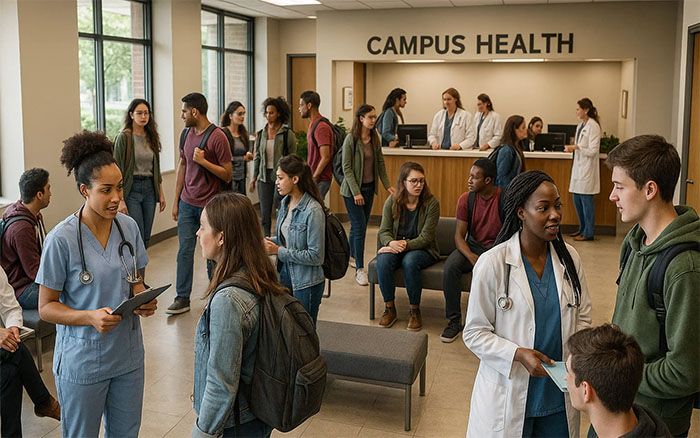The Impact of Sleep on Academic Performance
Encouraging Healthy Sleep Habits

Sleep is often the first thing students sacrifice when faced with the demands of college life. According to the University of Georgia, college students are only getting an average of 6-6.9 hours of sleep per night. However, the CDC recommends getting at least 7 hours of sleep each night.
From late-night study sessions to early morning classes, sleep deprivation has become a common issue among students. In this blog, we’ll explore sleep’s critical role in learning and memory, the negative effects of sleep deprivation, and how colleges can promote better sleep hygiene among students.
The Importance of Sleep for Students
Enhances Learning and Memory
Sleep is essential for consolidating memories and processing information. During sleep, the brain reorganizes and integrates new information, which is crucial for learning. Studies have shown that students who get adequate sleep perform better on tests and have better recall of information compared to those who are sleep-deprived.
Boosts Cognitive Function
Adequate sleep enhances cognitive functions such as attention, problem-solving, and decision-making. These skills are vital for academic success, as they enable students to grasp complex concepts, engage in critical thinking, and make informed decisions.
Improves Mood and Mental Health
Sleep has a profound impact on mood and mental health. Students who get enough sleep are less likely to experience symptoms of depression and anxiety, which can hinder academic performance. Good sleep hygiene promotes emotional stability, resilience, and overall well-being.
The Consequences of Sleep Deprivation
Increased Risk of Health Issues
Chronic sleep deprivation is linked to a range of health problems, including weakened immune function, obesity, and cardiovascular disease. For students, this means more sick days and less energy to participate in academic and extracurricular activities.
Decreased Safety
Sleep-deprived students are at a higher risk of accidents and injuries, both on and off campus. For example, drowsy driving can be just as dangerous as driving under the influence of alcohol. Ensuring students get enough sleep can help keep them safe.
Promoting Better Sleep Hygiene on Campus
Educating Students About Sleep
Colleges can play a significant role in promoting healthy sleep habits by educating students about the importance of sleep. Workshops, seminars, and informational campaigns can help raise awareness about the benefits of good sleep hygiene and provide practical tips for improving sleep quality.
Gain unique tips for promoting campus resources here.
Creating a Sleep-Friendly Environment
The campus environment can significantly impact students’ sleep patterns. Colleges can take steps to create a sleep-friendly environment by:
- Implementing Quiet Hours: Establishing (and consistently enforcing) quiet hours in dormitories can help minimize noise and create a conducive environment for sleep.
- Improving Dorm Room Comfort: Providing comfortable mattresses, blackout curtains, and temperature control can enhance sleep quality.
- Encouraging Regular Sleep Schedules: Maintaining a consistent sleep schedule, even on weekends, can help students regulate their sleep patterns.
Offering Resources and Support
Providing resources and support for students struggling with sleep issues is essential. This can include:
- Access to Sleep Clinics or Counseling Services: Offering on-campus sleep clinics or counseling services can help students address sleep disorders or other underlying issues affecting their sleep.
- Stress Management Programs: Programs that teach stress management techniques, such as mindfulness and relaxation exercises, can help students manage stress and improve their sleep quality.
Encouraging Healthy Lifestyle Choices
Promoting overall health and wellness can also contribute to better sleep hygiene. Colleges can encourage students to adopt healthy lifestyle choices by:
- Promoting Physical Activity: Regular exercise can help regulate sleep patterns and improve sleep quality.
- Providing Nutritious Food Options: A balanced diet supports overall health and promotes better sleep.
- Limiting Caffeine and Alcohol: Educating students about the impact of caffeine and alcohol on sleep can encourage healthier consumption habits.
Key Takeaways
The impact of sleep on academic performance is undeniable. By promoting healthy sleep habits, colleges can help students achieve their full academic potential and enhance their overall well-being. Colleges can play a crucial role in fostering good sleep hygiene among students through education, creating a sleep-friendly environment, offering resources and support, and encouraging healthy lifestyle choices.


















